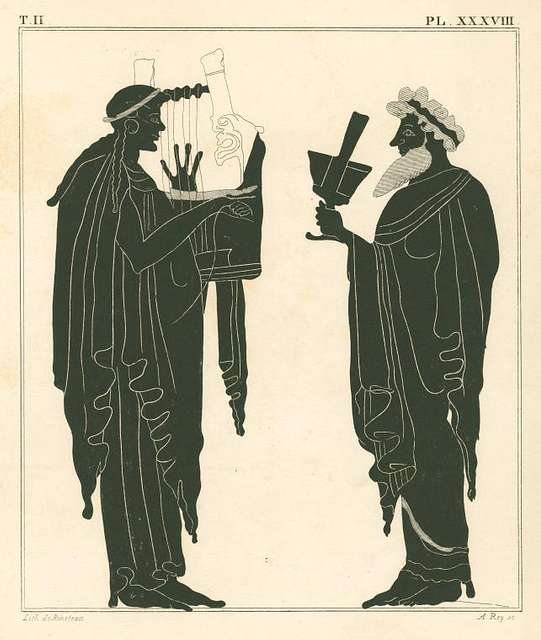
Measurements of Success in Sports & Studies
You may have seen the new Netflix documentary ‘Beckham’, about one of England’s most well-known footballers. Near the start, Beckham talks about his school days


Jess Barga is an MYP/DP Language & Literature / ToK teacher and sometime-reveler. She is a fervent ambivert, and enjoys bouncing between opposite extremes, sometimes perilously.


Last week, the OYIS Grade 11 DP English Language & Literature students began a unit on Euripides’ final play, The Bacchae. Like most ancient Greek tragedies, this is a gruesome tale of exaggerated vengeance, visited upon mortals by unreasonable gods. Unlike most tragic heroes, though, the protagonist himself is a god—Dionysus (AKA Bacchus), the Greek god of madness, wine, ecstasy and drama.
Planning the unit reminded me that The Bacchae was the first text I taught as a DP English Literature teacher, way back in 2010 at an international school in Venezuela. I was brand new to the school and the IB programme, and still very green as an English teacher, having spent most of my career teaching Spanish. It thrilled me that my eleventh-grade students were so intrigued by the story. They seemed to like it as much as I did—alas, not an everyday occurrence in English class. I think the enduring appeal of this particular play speaks to the universal plight it describes: the struggle in each human being to balance their internal contradictions. We are rational thinkers, but also impulsive, emotive beasts; we crave the order and convenience of the city, but experience primeval joy when we immerse ourselves in nature; we value restraint and productivity, but cherish the prospect of a holiday full of hedonism.
In the play, the new god Dionysus, son of Zeus and a mortal woman, returns to Thebes, the town of his birth, where most people reject his divinity and consider his immortal parentage to be a hoax. Of course, Dionysus’s mission is to prove them wrong in the grisliest fashion, so he bewitches the women of Thebes to join him in Bacchic revelry in the wilderness outside the city. There they become the Bacchae, dancing freely in animal skins and making wine spurt from the ground with magic staffs. Dionysus tricks their king, the uptight and ultra-rational Pentheus, to disguise himself as a woman and spy on their secret rituals, and the curious king pays a shockingly high price for his transgression.
For me, the most relevant modern interpretation of this ancient story involves the presence of opposite extremes—personified by Dionysus and Pentheus—within each human being. We are brain and we are body, but the society we’ve designed overvalues the intellect and rewards us when we repress its opposite. In teaching it to high school students, naturally, I stress that the play is not a literal invitation to abandon ourselves to a wine-soaked wilderness retreat. Still, most of us regardless of age can benefit from the reminder to honor and accept our wild and unruly side, just as we strive to maximize our intellectual achievements. For some, this might mean deep relaxation or meditation; for others, sport, dance, video games; for plenty of us, the delights of a long, rich meal or a night out with friends. Of course we relish the chance to do these things when we stand on the brink of a three-week vacation, but relegating these pleasures to the holidays puts us at risk of serious agony when the calendar inevitably catches up with us.
The IB Learner Profile includes the attribute of balance. Students have joked to me that it’s painfully ironic when teachers preach balance and in the same breath announce taxing summative assessments, and I sympathize. But it’s up to every individual to determine where we draw our lines between cold-eyed restraint and reckless abandon, and to arrange our lives accordingly, understanding that to lead fulfilling lives, few of us can successfully smother an entire half of our natures. For me, at least, averaging the two and seeking moderation in all things simply does not work: it dilutes my extremes and waters me down as a person.
How does The Bacchae end? Well, I’m not going to spoil it for you! Suffice it to say that it’s bloody and mad, not for the faint of heart. If you want to avoid a gruesome fate yourself, though, do yourself a favor and celebrate your extremes, during the holidays, but also beyond. Don’t mix them together and take the zero-sum average… instead, determine what your inner Bacchante demands of you, and give her the respect she’s due.

You may have seen the new Netflix documentary ‘Beckham’, about one of England’s most well-known footballers. Near the start, Beckham talks about his school days

Students who are eligible for Grades 10 or 11 in August 2023 are invited to take the 2022 Scholarship Exam. This exam is the first step to potentially receiving the OYIS Achievement Award.

Home > Welcome to OYIS Alumni Chats, a new blog series where we catch up with our alumni and see what they’ve been up to

Home > With a new year comes a new burst of energy, new motivation, new changes, and New Year’s resolutions. Dating back to the Babylonian

Home > As the summer break comes to an end, I have found myself unconsciously reflecting on how I spent these last few weeks. I

Home > Osaka YMCA International School is hosting a professional learning event on Saturday, February 8, 2025. The focus of the sessions will be Rethinking
Click here to start your application
Sign in Here
Osaka YMCA International School – Copyright 2025